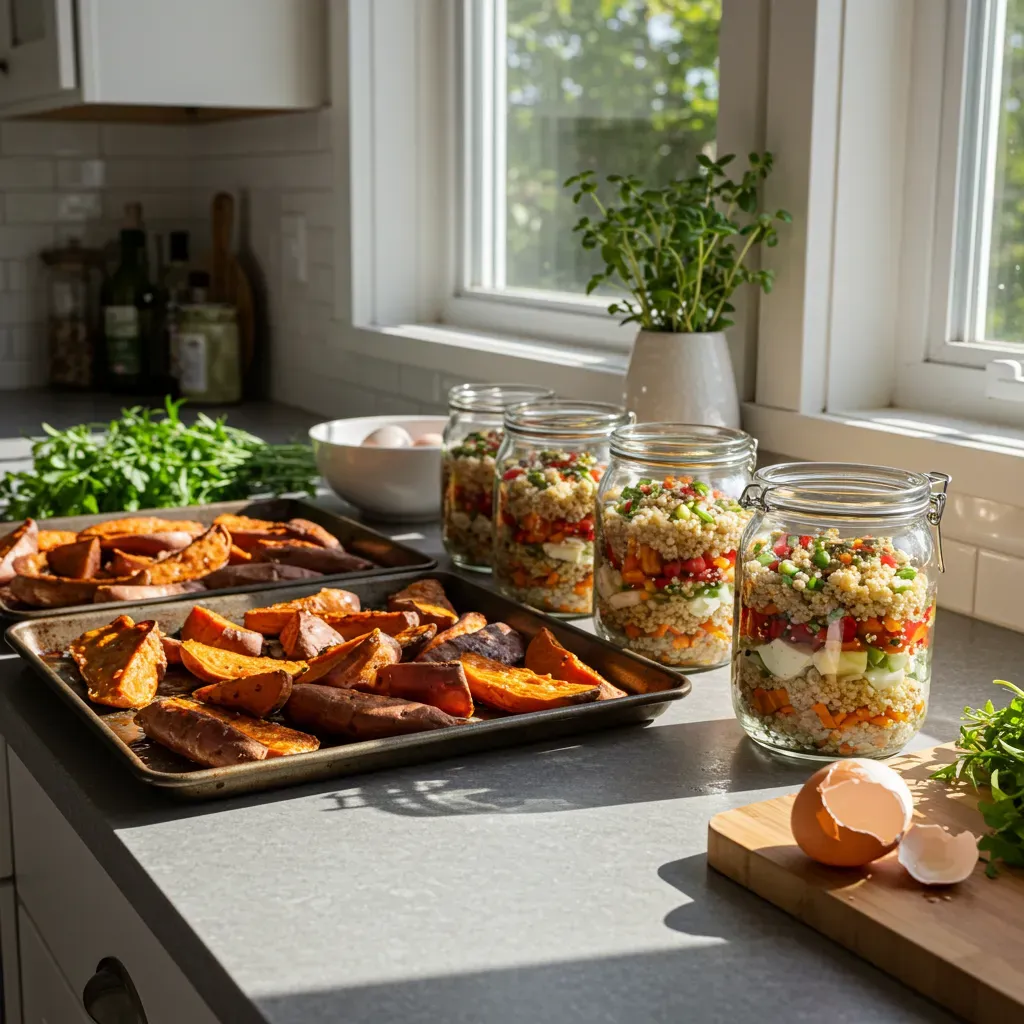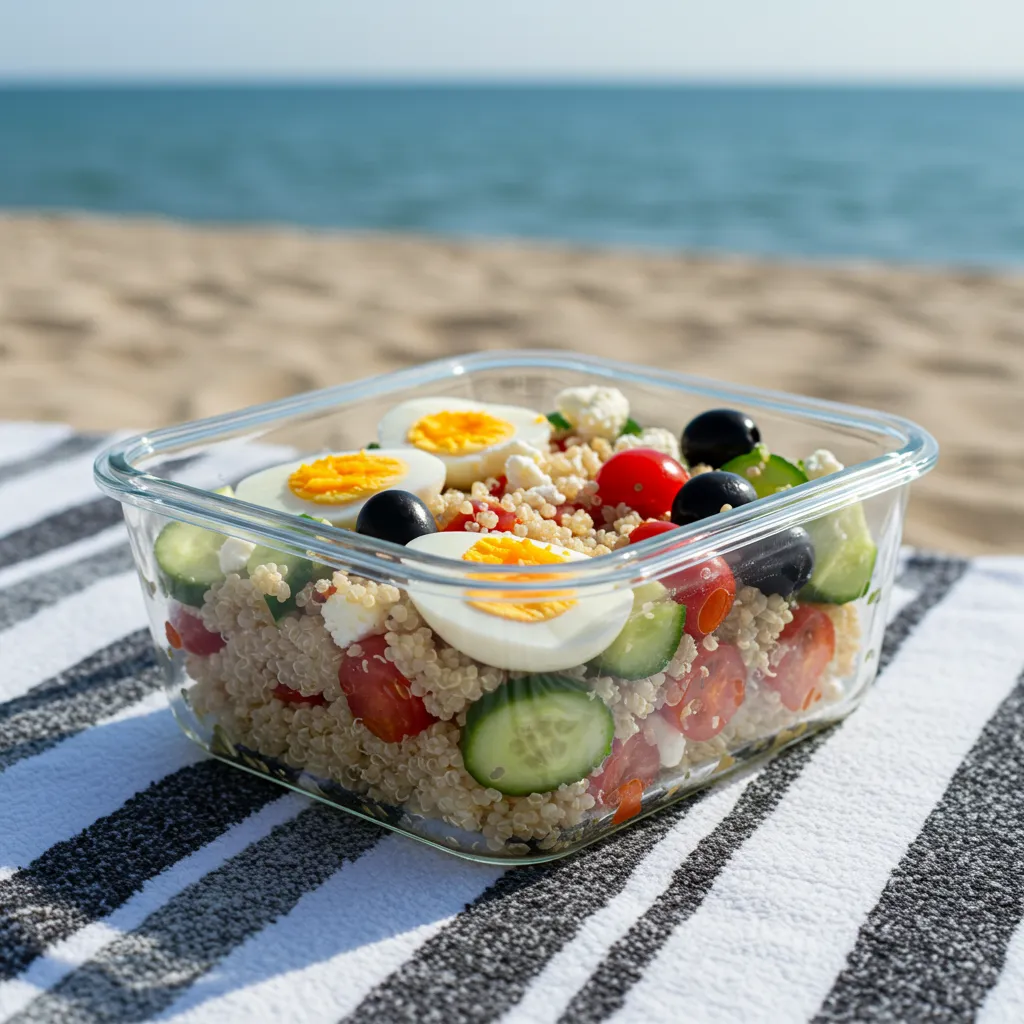As a registered dietitian for 15 years, I’ve helped busy families eat healthy. I’ve learned that organic beach meal prep isn’t just about making things easier; it’s also about making a system that keeps your family fed during the busiest days of summer. I’ve perfected a way to turn Sunday meal prep into five days of delicious, heat-stable organic meals by taking my own kids to the beach in Portland and working with health-conscious clients.
The truth hits home when families give up on their healthy eating goals as soon as they start packing for the beach. The American Journal of Clinical Nutrition says that adults who don’t plan their meals eat more than 200 extra calories every day and are 50% more likely to have trouble keeping their weight in check. But there’s a bigger problem than just the numbers: how to stick to your clean eating goals when you’re around processed foods, sugary drinks, and the urge to give up on your nutritional goals during summer outings.
Why making meals for the beach the old-fashioned way doesn’t work
The Organic Challenge I Found
During a family beach weekend at Cannon Beach three summers ago, my 8-year-old daughter asked why our lunches, which are usually “rainbow-colored,” had turned into another bag of processed snacks from the beach store. At that moment, I had to face a gap in my professional knowledge: I could help families prepare meals at home, but I hadn’t figured out how to deal with the unique problems that come with preparing meals on the beach.
The issue was not inadequate planning; rather, it was comprehending the distinct behavior of organic foods in environments characterized by heat, humidity, and sand. Traditional meal preparation guidance fails to consider:
The stability of organic proteins at different temperatures (many don’t have preservatives that make them last longer)
Fruits and vegetables that don’t have pesticides spoil faster in the heat.
When organic and regular foods share cooler space, there is a risk of cross-contamination.
Keeping nutrients safe when exposed to the outdoors for a long time
That weekend, I completely changed how we did things, focusing on three main ideas that are now the basis of my organic beach meal prep system:
Organic foods keep more nutrients when they are handled properly, so you get the most nutrition with the least amount of heat.
Flavor improvement over time—beach meals need to taste better when served cold, unlike winter comfort foods.
Parts that can change to fit changing needs—some days at the beach call for light snacks, while others need a lot of fuel.
The end result? A system for Sundays that lasts 90 minutes and gives you five days of different, organic meals that taste better as the week goes on.
The Science-Based Key to Success in Organic Beach Meal Prep
What You Need to Know About Heat-Stable Organic Nutrition
My Bachelor of Science in Nutrition from Oregon State University taught me that to make organic beach meals, you need to know how heat affects the safety and nutritional value of food. The Journal of Food Science says that some organic foods are better for you when eaten at moderate temperatures, while others are better for you when kept cool all the time.
This research is the basis for my method of preparing organic beach meals:
Foods with low water activity naturally stop bacteria from growing.
Organic foods that are high in acid make it hard for bad bacteria to grow.
Organic proteins that are already cooked, like hard-boiled eggs from chickens that live on pasture, stay stable for hours.
Strategic layering keeps flavors from mixing and temperatures from changing.
The 40-30-30 Rule for Beach Days Has Changed
After working with clients for years, I’ve learned that preparing meals for the beach in an organic way requires a different approach to macronutrients than regular meal prep:
40% of the carbs come from cooling foods like organic quinoa salads and vegetable-based meals.
30% lean organic protein, with a focus on options that can be made ahead of time and don’t need to be reheated
30% healthy fats from sources that give you energy without making you feel heavy
The International Journal of Obesity published research showing that meals with this balance keep you full for 23% longer than meals high in carbs. This is important for avoiding energy crashes in the afternoon on busy beach days.
The Carter Way: My 5-Step System for Preparing Organic Beach Meals
Step 1: Plan your organic shopping (15 minutes)
I’ve found 20 key organic ingredients that are the basis for making beach meals that work after trying out hundreds of combinations. This focused method cuts shopping time by 40% and gives you the most options for meals.
Choose 2–3 organic proteins that are stable at high temperatures each week:
My top choice for versatility is organic pasture-raised hard-boiled eggs.
Pre-cooked organic rotisserie chicken (saves 45 minutes of cooking time)
Canned salmon or tuna that was caught in the wild
Organic black beans and chickpeas (great for salads that don’t need to be cooked)
Greek yogurt that is organic and has 2% fat (the best for probiotics and feeling full)
Organic complex carbs that are good for you:
Organic quinoa (cooks quickly and stays fluffy when cold)
Organic sweet potatoes (roast a whole batch for different uses)
A mix of organic brown and wild rice
Wraps and breads made with whole grains that are organic
Organic Fats That Are Clean:
Buy organic avocados at different stages of ripeness so you can use them for a week.
Uncooked organic nuts and seeds
Extra virgin organic olive oil for dressings you make at home
Natural nut butters and organic tahini

Step 2: The 90-Minute Kitchen Prep Session
After three years of fine-tuning, here’s my exact Sunday schedule that keeps me out of the heat as much as possible while still getting a lot done:
Minutes 1–15: Getting ready and setting up
If you need to roast something, preheat the oven to 425°F.
Put a big pot of water on the stove to boil for the eggs.
Wash and get all the vegetables ready in cool water.
Set up the assembly line with glass jars.
Batch Cooking: 16 to 45 Minutes
Put eggs in boiling water and set a timer for 12 minutes.
Roast any vegetables or sweet potatoes you need.
Put quinoa in the rice cooker.
Get ready any proteins that don’t need to be cooked.
Minutes 46 to 75: The Assembly Phase
Put eggs in an ice bath and peel them.
Put proteins in separate containers.
Mix dressings and sauces that go well together.
Put together grab-and-go parts.
Minutes 76–90: Organizing and Storing
Put the date and contents on the containers.
Keep wet and dry ingredients apart so they don’t get soggy.
Put tomorrow’s lunch in a place where you can easily get to it.

Five Beach Meal Prep Recipes from Signature Organic
1. Organic Mediterranean Power Bowls
This mix actually tastes better after 3–4 days, which makes it perfect for making beach meals.
For each serving:
2 hard-boiled eggs that are organic and chopped
1/2 cup of cooked quinoa that is organic
1/4 cup of chopped organic cucumber
1/4 cup of organic cherry tomatoes, cut in half
Two tablespoons of organic Kalamata olives
2 tablespoons of crumbled organic feta cheese
1 tablespoon of organic lemon-herb dressing
Tip for storing: Keep the dressing separate until you’re ready to serve it to keep the best texture.
2. Organic egg salad with curry
A lighter version of mayo-based versions with 40% fewer calories and good probiotics.
Things you need:
Chopped up six organic hard-boiled eggs
1/2 cup of Greek yogurt that is organic
1 teaspoon of organic curry powder
1/2 an organic apple, chopped up, 2 organic celery stalks, minced
Serve it on organic mixed greens, in organic whole-grain wraps, or with slices of organic cucumber.

3. Organic Egg and Avocado Bowls with an Asian Twist
The right amount of protein, healthy fats, and fresh vegetables that taste better when they’re cold.
Parts:
Two organic hard-boiled eggs, cut into pieces
1/2 cup of organic brown rice that has cooled down
1/4 cup of organic edamame
1/4 of an organic avocado, cut into slices; organic carrots and cucumber cut into julienne strips
Dressing made with organic sesame and ginger and a drizzle of sriracha
Advanced Strategies for Preparing Organic Beach Meals
The Container System That Changes the Game
I got hundreds of questions about storage systems after I talked about planning family meals on Good Morning America. Here’s what I know works for making organic meals at the beach:
For salads, use wide-mouth mason jars with dressing on the bottom, hard vegetables next, grains in the middle, and soft greens on top. Keeps things from getting soggy for up to five days.
For grain bowls, glass containers with dividers keep the different parts separate until they are ready to eat. For most of my organic beach meal prep, I use Pyrex containers with three compartments.
Individual portion containers for proteins stop people from eating too much and make it easy to grab and go. To keep moisture from building up, portion proteins right after cooking them while they are still warm.
Make-Ahead Sauce That Changes the Game
Having tasty sauces on hand can turn simple meal parts into exciting new combinations. I always have three choices ready:
Organic Green Goddess (lasts for a week): Mix together organic Greek yogurt, avocado, herbs, lemon juice, and garlic. Great for salads with eggs and bowls of grains.
Asian-Style Organic Peanut (lasts for two weeks): Peanut butter, rice vinegar, sesame oil, fresh ginger, and a little honey are all natural and organic. Changes basic proteins and vegetables.
Mediterranean Organic Herb Oil (3-week shelf life): Extra virgin organic olive oil mixed with fresh herbs, lemon zest, and red pepper flakes. Makes any dish better right away.
How to Solve Common Problems with Organic Beach Meal Prep
“My Organic Salads Always Get Wet”
At first, this was the most frustrating thing for me. The answer is to layer things correctly and keep them dry:
Always dress salads right before you eat them.
Put paper towels in containers to soak up extra moisture.
Keep wet ingredients like tomatoes and cucumbers in separate small containers until you’re ready to serve.
Instead of delicate lettuces, go for heartier organic greens like romaine or kale.
“I Get Tired of Eating the Same Things”
Rotating strategic components gives you variety without changing the whole meal:
Make 2 to 3 different kinds of organic grains every week.
Change up your protein sources.
Mix up the vegetables you use.
Every four to five days, change the dressings and sauces.
Put on different toppings, such as organic cheese, nuts, seeds, and fresh herbs.
Week One: Learn the Basics of Your Own Organic Beach Meal Prep System
To begin, you only need three things: one protein source (organic hard-boiled eggs are great for beginners), one grain (quinoa is always a good choice), and a mix of organic vegetables. Instead of complicated flavors, focus on mastering simple combinations and timing.
Week Two: Make It More Complicated
Add sauces and spices. This is where organic beach meal prep goes from useful to fun.
Success in the Long Run
Being flexible and kind to yourself, not being perfect, is the key to long-term success. I still don’t prepare meals for weeks at a time. The system works because it changes to fit real life, not the other way around.
Keep in mind that the goal of successful organic beach meal prep is not to be perfect, but to make progress. Making healthy meals ahead of time is a way to invest in your health, energy, and overall well-being. Begin with small steps, keep going, and celebrate each win along the way.